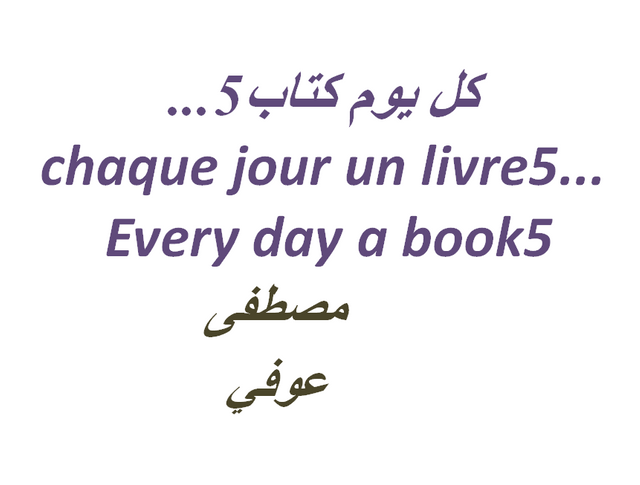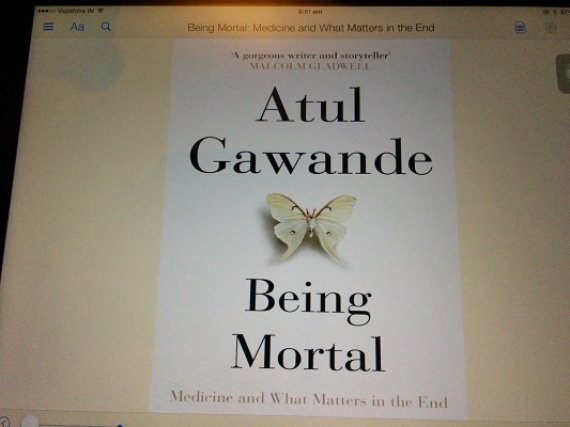كل يوم كتاب5... Chaque jour un livre...5... Every day a book...5
Being Mortal: هل على الطب أن يفسح المكان لعزرائيل في الوقت المناسب؟
1- النسخة العربية.
2- la version français
3- version English
في نبذة قصيرة بالغة التعبير، تقول إحدى القارئات على موقع "غودريدز" الشهير، تعليقاً على هذا الكتاب بأنها تنصح بقراءة هذا الكتاب بشكل فوري، لأي شخص "يعتقد أنه سوف يكبر بمرور الوقت، وأنه سيموت يوماً ما، أو لديه أقارب يدرك أنهم سوف يتعرضون لهذا يوماً ما"، القارئة تضيف أنها تنصح بهذا الكتاب لأي أحد "فوق الخمسين عاماً، أو لديه أحد غالٍ على قلبه فوق الخمسين”.
في منتصف كتابه الذي بقي محتلاً قمة قائمة المبيعات، أتول غواندي، مؤلف الكتاب، والجراح في مستشفى بريغهام ومستشفى النساء في بوسطن، يسوق تشبيهاً يقول: "إن الموت هو العدو، لكن هذا العدو لديه قدرات متفوقة، لذلك فإنه يفوز في النهاية لا محالة، وفي حرب لا فوز فيها، أنت لا تريد قائداً/ طبيباً، يصر أن يحارب حتى مرحلة الإبادة الكاملة"، في سياق الفكرة الأساسية للكتاب، التي تثير نقطة أن الطب أصبح يحشد كل طاقاته لإطالة الحياة، لكن ذلك، قاد إلى عدد مهول من الذين يموتون بالكثير من الخراطيم المحشورة في كل مكان في أجسادهم وحيدين على أسرة الرعاية المركزة في المستشفيات.
الأمر كما قالت القارئة في البداية، ليس بعيداً عنا مطلقاً، وأنت لست بآمن من الاضطرار لاتخاذ القرارات، بل إنك ربما واجهته بالفعل، ربما مرض جدك أو جدتك، مرضاً مميتاً، لكن العائلة أصرت أن تعالجهم حتى النهاية، رغم أن العلاج لم يفعل شيئاً إلا أن جعل البقية الباقية من وقتهم على هذه الأرض أكثر بؤساً فحسب، مستنزفينه في آلات وصالات مستشفيات وجلسات علاج إشعاعي أو كيماوي غير مجد في المراحل المتأخرة، إلا في تقليل إحساس العائلة بالذنب.
الأطباء، يفعلون كل شئ لإطالة حياتك أقصى ما يمكن، ولكن، هل هذا حقاً ما تحتاجه؟
من وحي قصة مرض والده، وجد زوجته، يساعد غواندي أولئك الذين يعيشون تجربة الاحتضار، أو لديهم أحباب يعيشون هذه التجربة، لاتخاذ أفضل القرارات الطبية في هذا الموقف المربك.
المصدر
Dans Being Mortal, l'auteur à succès Atul Gawande s'attaque au défi le plus difficile de sa profession: comment la médecine peut non seulement améliorer la vie, mais aussi le processus de sa fin
La médecine a triomphé dans les temps modernes, transformant la naissance, les blessures et les maladies infectieuses de déchirantes à gérables. Mais dans l'inévitable condition du vieillissement et de la mort, les buts de la médecine semblent trop souvent aller à l'encontre de l'intérêt de l'esprit humain. Les maisons de retraite, soucieuses de la sécurité, épinglent les patients dans des lits à balustrades et des fauteuils roulants. Les hôpitaux isolent les mourants, en vérifiant les signes vitaux longtemps après que les objectifs de la guérison sont devenus discutables. Les médecins, engagés à prolonger la vie, continuent à mener des procédures dévastatrices qui finissent par faire souffrir.
Gawande, un chirurgien praticien, aborde la limite ultime de sa profession, soutenant que la qualité de vie est l'objectif souhaité pour les patients et les familles. Gawande offre des exemples de modèles plus libres et socialement satisfaisants pour aider les personnes âgées infirmes et dépendantes, et il explore les différentes formes de soins palliatifs pour démontrer que les dernières semaines ou mois d'une personne peuvent être riches et dignes.
Plein de recherches révélatrices et de contes passionnants, Being Mortal affirme que la médecine peut consoler et améliorer notre expérience jusqu'à la fin, offrant non seulement une bonne vie, mais aussi une bonne fin.
In Being Mortal, bestselling author Atul Gawande tackles the hardest challenge of his profession: how medicine can not only improve life but also the process of its ending
Medicine has triumphed in modern times, transforming birth, injury, and infectious disease from harrowing to manageable. But in the inevitable condition of aging and death, the goals of medicine seem too frequently to run counter to the interest of the human spirit. Nursing homes, preoccupied with safety, pin patients into railed beds and wheelchairs. Hospitals isolate the dying, checking for vital signs long after the goals of cure have become moot. Doctors, committed to extending life, continue to carry out devastating procedures that in the end extend suffering.
Gawande, a practicing surgeon, addresses his profession's ultimate limitation, arguing that quality of life is the desired goal for patients and families. Gawande offers examples of freer, more socially fulfilling models for assisting the infirm and dependent elderly, and he explores the varieties of hospice care to demonstrate that a person's last weeks or months may be rich and dignified.
Full of eye-opening research and riveting storytelling, Being Mortal asserts that medicine can comfort and enhance our experience even to the end, providing not only a good life but also a good end.
